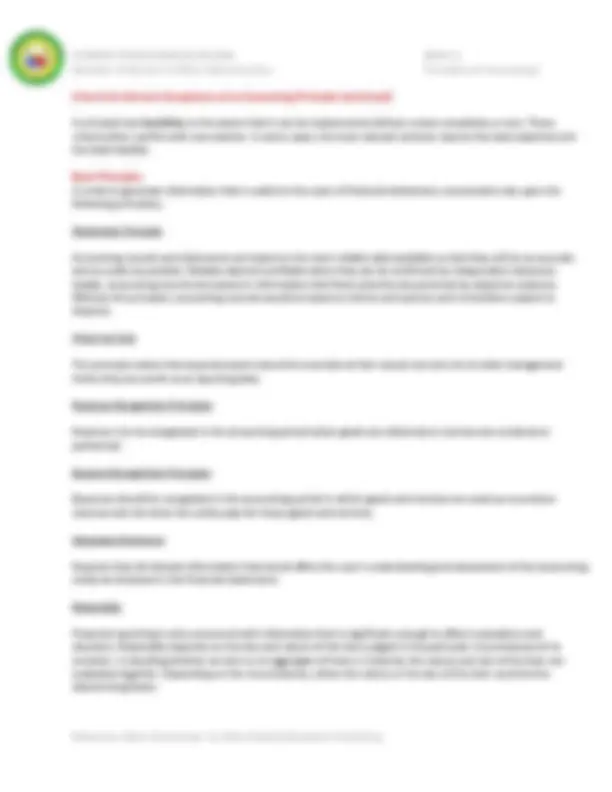



Study with the several resources on Docsity

Earn points by helping other students or get them with a premium plan


Prepare for your exams
Study with the several resources on Docsity

Earn points to download
Earn points by helping other students or get them with a premium plan
Community
Ask the community for help and clear up your study doubts
Discover the best universities in your country according to Docsity users
Free resources
Download our free guides on studying techniques, anxiety management strategies, and thesis advice from Docsity tutors
Accounting Concepts and Principles.pdf
Typology: Lecture notes
1 / 2

This page cannot be seen from the preview
Don't miss anything!


Bachelor of Science in Office Administration Principles of Accounting I Reference: Basic Accounting" by Winlu Ballada Domdane Publishing Accounting concepts and principles Fundamental Concepts Several fundamental concepts underlie the accounting process. In recording business transactions, accountants, should consider the following: Entity Concept The most basic concept in accounting is the entity concept. An accounting entity is an organization or a section of an organization that stands apart from other organizations and individuals as a separate economic unit. Simply put, the transactions of different entities should be accounted for together. Each entity should be evaluated separately. Periodicity Concept An entity’s life can be meaningfully subdivided into equal time periods for reporting purposes. It will be aimless to wait for the actual last day of operations to perfectly measure the entity’s profit. This concept allows the users to obtain timely information to serve as a basis on making decisions about future activities. For the purpose of reporting to outsider, one year is the usual accounting accounting period. Stable Monetary Unit Concept The Philippine peso is a reasonable unit of measure and that its purchasing power is relatively stable. It allows accountants to add and subtract peso amount as though each peso has the same purchasing power as any other peso at any time. This is the basis for ignoring the effects of inflation in the accounting records. Criteria for General Acceptance of an Accounting Principle Accounting practices follow certain guidelines. GAAP, which stands for Generally Accepted Accounting Principles, encompass the conventions, rules and procedures necessary to define accepted accounting practice at a particular time. Accounting principles are established by humans. Unlike the principles of physics, chemistry, and the other natural sciences, accounting principles were not deduced from basic axioms, nor can they be verified by observation and experiment. Instead, they have evolved. This evolutionary process is going on constantly; accounting principles are not eternal truths. The general acceptance of an accounting principle usually depends on how well it meets three criteria; relevance, objectivity and feasibility. A principle has relevance to the extent that it results in information that is meaningful and useful to those who need to know something about a certain organization. A principle has objectivity to the extent that the resulting information is not influenced by the personal bias or judgement of those who furnish it. Objectivity connotes reliability and trustworthiness. It also connotes verifiability, which means that there is some way of finding out whether the information is correct.
Bachelor of Science in Office Administration Principles of Accounting I Reference: Basic Accounting" by Winlu Ballada Domdane Publishing Criteria for General Acceptance of an Accounting Principle (continued) A principle has feasibility to the extent that it can be implemented without undue complexity or cost. These criteria often conflict with one another. In some cases, the most relevant solution may be the least objective and the least feasible. Basic Principles In order to generate information that is useful to the users of financial statements, accountants rely upon the following principles; Objectivity Principle Accounting records and statements are based on the most reliable data available so that they will be as accurate and as useful as possible. Reliable data are verifiable when they can be confirmed by independent observers. Ideally, accounting records are based on information that flows activities documented by objective evidence. Without this principle, accounting records would be based on whims and opinion and is therefore subject to disputes. Historical Cost This principle states that acquired assets should be recorded at their actual cost and not at what management thinks they are worth as at reporting date. Revenue Recognition Principles Revenue is to be recognized in the accounting period when goods are delivered or services are rendered or performed. Expense Recognition Principles Expenses should be recognized in the accounting period in which goods and services are used up to produce revenue and not when the entity pays for those goods and services. Adequate Disclosure Requires that all relevant information that would affect the user’s understanding and assessment of the accounting entity be disclosed in the financial statements. Materiality Financial reporting is only concerned with information that is significant enough to affect evaluations and decisions. Materiality depends on the size and nature of the item judged in the particular circumstances of its omission. In deciding whether an item or an aggregate of items is material, the nature and size of the item are evaluated together. Depending on the circumstances, either the nature or the size of the item could be the determining factor.